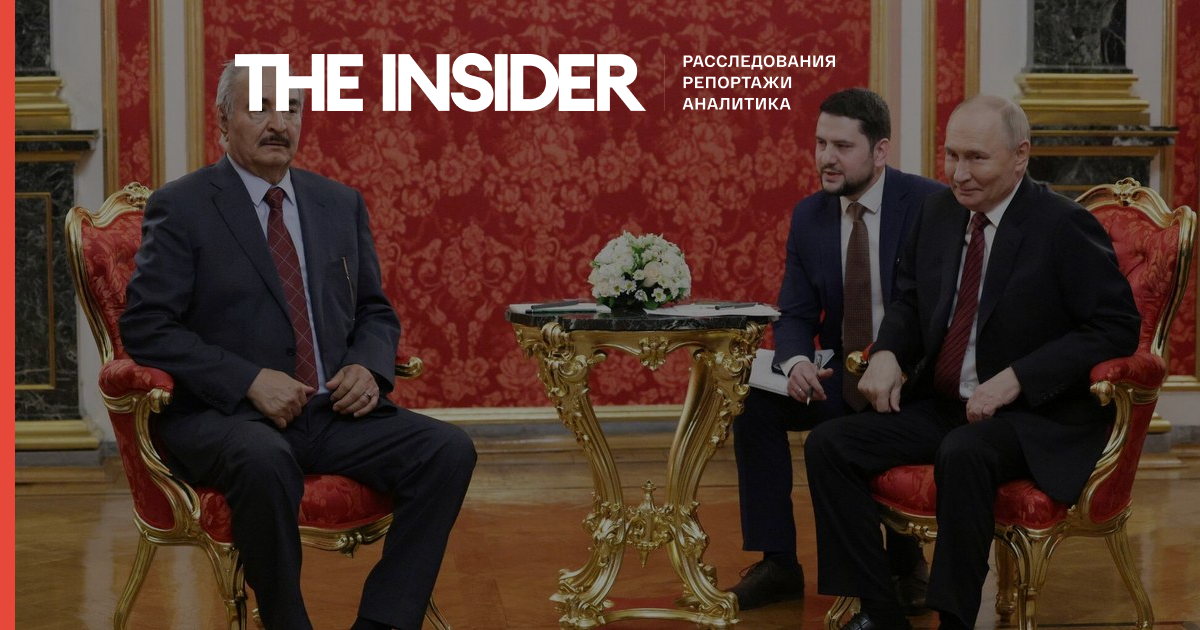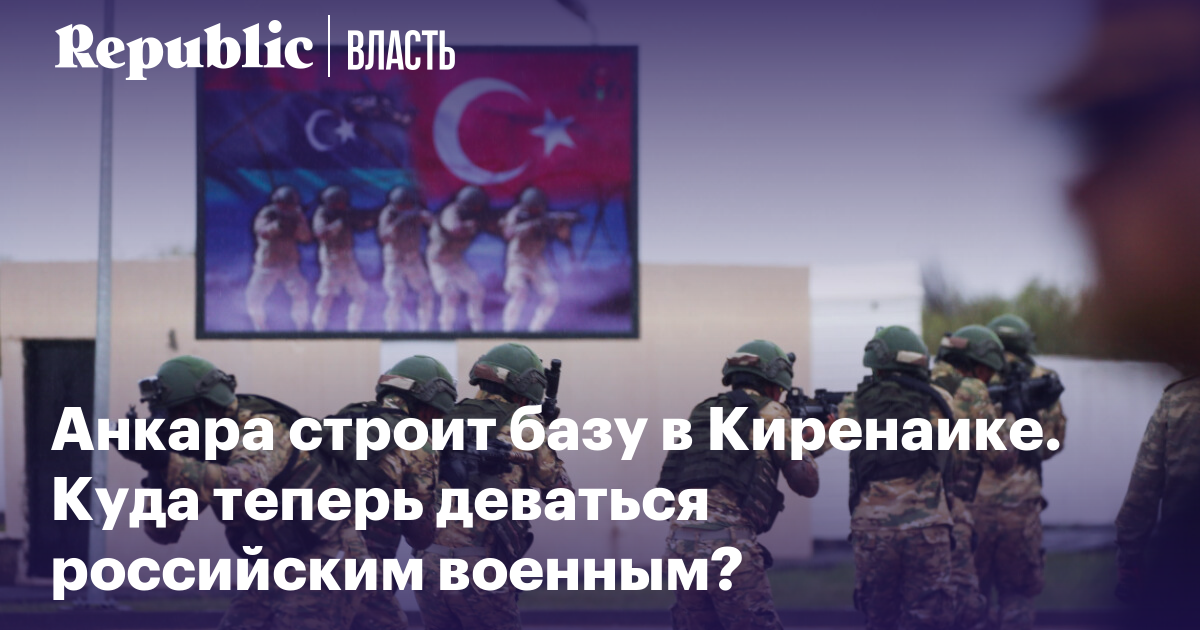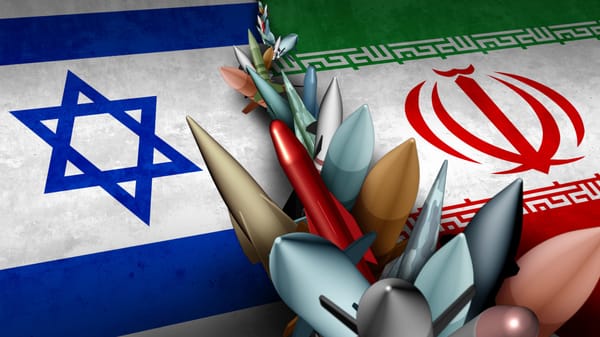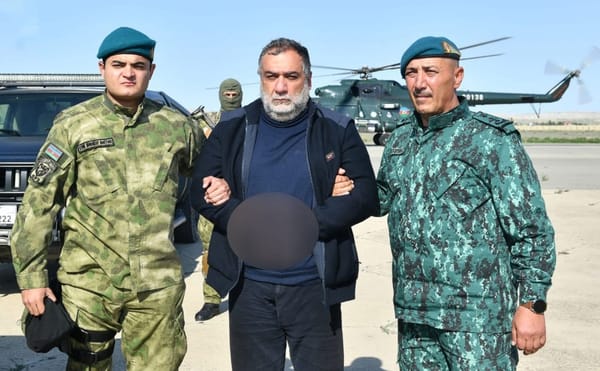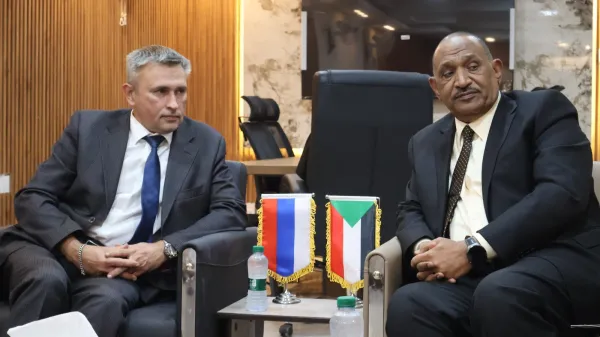Turkish Rook on the Libyan Board, or What to Do When Both Opponents Now Play with Pieces of the Same Color?

Recent clashes in Tripoli, upon closer examination, appear to be more than just another flare-up in Libya’s endless civil war. This time, the situation seems much more serious not only from a domestic political perspective but also in terms of global politics. The weakening of Dbeiba’s government is a significant but not decisive event. Former Russian diplomat Sergey Konyashin explored why these are more like “wood chips” flying off during a “logging operation” happening at the opposite end of this North African country, involving two major external players — one of which is Russia.
On the evening of May 12, 2025, Libya’s capital plunged once again into chaos. After the assassination of the commander of the so-called “Stability Support Service,” Abd al-Ghani al-Kikli (known as Ganiva), fierce fighting erupted in Tripoli between this group and the 444th Infantry Brigade. Fighters from the latter quickly took control of the city’s port, the local prison building, immigration agency offices, and several key districts, effectively paralyzing and blocking the entire city. The clashes were accompanied by widespread looting, arson, and prison breaks. According to the UN mission’s count, at least eight civilians were killed and dozens wounded.
A ceasefire was formally declared two days later, on May 14, but it did not bring a complete end to the violence. Sporadic clashes continued for several more days. Mitiga Airport had to be closed, with all flights redirected to Misrata. Schools canceled classes, and local authorities ordered residents to stay indoors. Entire neighborhoods emptied. Amid this turmoil, pressure on Abd al-Hamid Dbeiba’s government increased. A wave of mass protests swept Tripoli, demanding the resignation of his cabinet. Under public pressure, at least two ministers—Abu Bakr al-Ghawi (Housing) and Badreddin al-Toumi (Local Governance)—resigned. The situation continues to escalate.
Notably, the political crisis in Libya’s capital has flared up amid a sharp shift in the balance of power in the east of the country, controlled by Field Marshal Khalifa Haftar, Moscow’s allied commander of the so-called “Libyan National Army” (LNA). Since early 2025, Turkey—previously a supporter of the Tripoli government now facing the above problems—has also begun to build a trusting relationship with Haftar. It appears that for Ankara, which is expanding its geostrategic influence, this is a new way to assert itself in the region, while for Haftar, it is an opportunity to diversify his partnerships.
Alongside the Libyan government in Tripoli, Moscow also appears to be one of the most affected parties by Erdogan’s subtle diplomatic game. Weakened by the war in Ukraine, Russia continues to send limited but noticeable military resources to Cyrenaica, hoping in vain to maintain a foothold for future operations in the Sahel. How successful this effort will be remains an open question. Let’s try to analyze everything step by step.
Libya — the New Syria?
Drones bearing white crescents on a red background are already circling over the Libyan desert, which until recently was almost entirely controlled by Russian military specialists. After the fall of Bashar al-Assad’s regime in Syria, Libya has become the new arena of direct confrontation between Moscow and Ankara, both actively vying for influence and resources. Russia is hastily sending weapons and instructors to support Marshal Haftar, but Turkey seems to be acting even faster and more effectively in the same direction, confidently strengthening its positions in North Africa. Today, the stakes are much higher than control over individual territories; the struggle is now for a new geostrategic balance across the entire Mediterranean region.
Until recently, Turkey and Marshal Khalifa Haftar’s Libyan National Army (LNA) were on opposite sides of the barricades. During the civil war, Ankara supported the “western” Government of National Accord in Tripoli, while Haftar, controlling the east of the country, relied more on support from Egypt, the UAE, and Russia. However, in spring 2025, there was an unexpected shift—Turkey began actively establishing direct contacts with the LNA, Moscow’s traditional ally and one of its main regional competitors.
The fall of Damascus in December 2024 dealt Moscow a blow comparable in scale to the infamous US withdrawal from Afghanistan three years earlier. Moscow suddenly lost control over two key pillars of its Middle Eastern presence—the naval base in Tartus and the Khmeimim airbase. Thus, Libya, previously considered only a “backup airfield,” suddenly became Moscow’s main foothold in the region. Flights of Il-76 and An-124 transport planes from Russian military bases in Syria to Libya have significantly increased since December last year, and heavy containers have begun to be urgently unloaded under tight security by Russian troops at the port of Tobruk.
According to The Soufan Center, in the first quarter of 2025, the number of Russians stationed at the Libyan airbase Brak ash-Shati increased by one and a half times (from about 300 to 450 people). Satellite images also clearly show a construction boom at the Ma’aten as-Sarra airbase in the south of the country near the border with Chad. There, runways are being urgently repaired, military hangars are being installed, and new fuel tanks are being built. It is obvious that this facility is being prepared to serve as a “long-range base” for operations in the Sahel region, where Russia has established a presence (primarily in Mali, Burkina Faso, and Niger).
At the same time, land corridors from the coast deeper into the continent have come to life. Columns of Russian military equipment and contingents of instructors, including personnel from the recently created Russian “African Corps,” are moving through the Haftar-controlled central part of Libya, transferred from Syria. Thus, the narrow supply line urgently established in Libya as a backup after losing Syria has, in just a few months, grown into a large network of Russian military infrastructure in North Africa.
Libyan Triangle
Against this backdrop, like a bolt from the blue, news emerged that Ankara, which had long publicly supported the Government of National Accord (GNA) in Tripoli — Haftar’s opponents in the civil war — suddenly changed its approach. On April 4, 2025, the chief of staff of the LNA, Saddam Haftar (son of Khalifa Haftar), unexpectedly arrived in Turkey. It quickly became clear that this was no mere protocol visit. During the meeting, the parties signed a defense cooperation agreement covering key strategic areas — from weapons supplies, including modern drones, and military training programs to the development of military infrastructure and joint naval exercises on Libya’s eastern coast.
By April 13, the Telegram channel “Bez Tormozov” reported that Turkey intends to establish a military base in the city of Ghat (southwest Libya), where a Turkish delegation has already inspected two airports. Moreover, amid strengthening bilateral ties, Turkish Airlines resumed flights to Benghazi, controlled by Haftar, for the first time in 10 years. According to the publication Jeune Afrique, the agreement is designed for the long term and includes 30 military training programs for Libyan forces over five years, focusing on mastering drone operations, their technical maintenance, engineering support, including demining, and other technical assistance. In addition, joint exercises and modernization of eastern Libya’s military infrastructure are being discussed as part of efforts to unify the currently fragmented armed forces.
We will, of course, never learn all the full details of these contacts, but the essence of the deal is clear — Turkey invests money, technology, and builds infrastructure, while the LNA grants it exclusive access to its territories and military bases in the southwest of the country. Thanks to this, Ankara now openly acts as the de facto new patron of the LNA, signaling a serious intention to establish itself in eastern Libya in opposition to Moscow. This gives both Turkey and Russia direct access to the Sahel. Thus, Ankara’s “Libyan gambit” — sacrificing its former ties with the GNA to quickly expand influence over the once pro-Russian LNA — is already bearing fruit.
This clearly shapes a classic “love triangle” — two influential actors (Moscow and Ankara), still geopolitical rivals, competing for the favor of the same Libyan general. As for Haftar himself, he appears to be consciously going along with this, aiming to reduce his growing dependence on Moscow and gain greater independence.
For Russia, this is undoubtedly a very unpleasant surprise. After losing Tartus, the Kremlin seriously intended to make Tobruk the main base for its operations in Africa. Now, with Erdogan cooperating with the very same partner in Libya but offering a much more attractive package, it is clear that in the long run, Russia is bound to lose this confrontation. Putin was never able to offer anything comparable, and after getting stuck in Ukraine, his options have only diminished.
Declining Power of Russia
Moscow has traditionally provided significant support to Haftar. By early 2020, about 1,200 mercenaries from the Wagner PMC were operating in Libya, carrying out a wide range of tasks — from targeted protection of facilities to direct participation in combat. By September of the same year, according to AFRICOM (the US Army command in Africa), their numbers had grown to around 2,000. Thanks to Putin’s backing, Haftar remained one of the leading contenders for a decisive victory in the civil war — and consequently, full control over Libya. However, despite the impressive scale of Russian military aid, Haftar failed to achieve such a victory due to its extremely low effectiveness.
Since 2022, Moscow’s capacity to sponsor ambitious operations on distant fronts has rapidly diminished. The reason for this, of course, is Putin’s disastrous war in Ukraine, which quickly depleted Russia’s military potential. In March 2022, 1,300 Wagner fighters were urgently withdrawn from Libya via Syria to be redeployed to the Ukrainian front. By the end of 2024, only about 800–1,000 Russian mercenaries remained in Libya, who, following the effective defeat of Wagner PMC, were formally subordinated to the Russian Ministry of Defense and reorganized into the so-called “African Corps.”
As the war in Ukraine demanded increasing concentration of Kremlin forces, and with large military bases in Syria that once seemed unshakable, the Libyan front began to recede into the background and at times even appeared to be a strategic burden. Especially since Russia’s investments in Haftar’s regime did not yield the expected returns. Haftar failed to accomplish his main goal — to capture all of Libya. His campaign on Tripoli in 2019–2020 ended in failure, and he was never able to fully restore his strategic potential after that setback.
Among the population in Haftar-controlled eastern Libya, frustration with his regime grew, and reliance on the Kremlin ceased to seem like a panacea. In the Middle East, it is well known how Russia consistently betrays one ally after another, never preventing their overthrow and never coming to their aid. The former dictator of Sudan, Omar al-Bashir, who was overthrown in 2019, still remains in prison in his home country, awaiting extradition to the International Criminal Court on charges of war crimes in Darfur. Ruben Vardanyan, a former state minister of Nagorno-Karabakh — abandoned by Moscow and left to its fate — and a once influential Russian businessman, remains imprisoned in Azerbaijan.
So far, only the ousted presidents of Ukraine and Syria, Viktor Yanukovych and Bashar al-Assad, who managed to reach Russian territory on their own, have found refuge there. However, for Haftar, an attempt to flee to Russia if necessary would likely fail, if only for purely geographical reasons. Therefore, by 2025, the problem of optimally balancing dependence on external partners became especially acute for him.
Maritime Power of Belarus
In a complex situation, Belarus, an ally of Russia, stepped in to support its presence in Libya. In February 2025, at Haftar’s initiative, an unprecedented tripartite protocol on the joint use of logistical facilities for the LNA was signed in Minsk. Formally, the document is an annex to the previous memorandum on military-technical cooperation between Russia and the LNA. Unexpectedly, the Ministry of Defense of Belarus joined this agreement, bypassing the long mandatory ratification process.
The agreement is designed for 25 years with the possibility of automatic renewal. It grants the allies 11.7 square kilometers of internal waters of the port of Tobruk, an adjacent land area, and numerous port infrastructure facilities within a ten-kilometer zone — fuel depots, repair workshops, UAV launch sites, and so on.
A source from The Insider familiar with the agreement claims that Moscow allegedly also obtained the right to station up to 1,200 of its military personnel there (a naval logistics battalion), plus helicopters, drones, and air defense systems, while Minsk would deploy its engineering specialists. There are rumors about a battery of modernized Buk missile systems. Moscow took on the reconstruction of the northern breakwater and the laying of a main fiber-optic cable to the Al-Abraq airbase, while Minsk is responsible for modernizing the port’s power station and installing a mobile dock.
In fact, Russia and Belarus have a joint headquarters in Libya, and part of the Kremlin’s operation is conducted “under the umbrella” of Belarus by agreement with Lukashenko. The servicemen of both countries are exempt from Libyan jurisdiction and taxes. UN observer inspections are allowed no more than once a year and only with prior notification.
Thus, Libya, initially filled with Russian and now also Belarusian specialists, has literally transformed within a few months from a “backup airfield” into a full-fledged stronghold for projecting Russian influence in the Central Mediterranean and Sahel regions (central Africa).
Divide [Directions of Cooperation] and Rule!
It is clear that diversifying external ties allows Haftar to solve several major strategic and geopolitical tasks at once.
First, it significantly reduces his dependence on Moscow. Whereas before Kremlin support had no alternative, Haftar now has another major ally to rely on. This greatly strengthens his position — balancing between several patrons not only expands his maneuvering space but also helps avoid excessive control and pressure from any one player.
Second, Haftar insures himself against possible policy changes by his former ally. It would be foolish to assume that the numerous and profound upheavals caused by the war in Ukraine will not alter Moscow’s foreign policy approaches. Therefore, it is not unreasonable to consider that the Kremlin, pursuing narrow situational interests, could simply shift its priorities or even move closer to Haftar’s opponents. Not to mention that a leader exhausted by a series of major failures, Putin might blame Haftar for setbacks in Libya and begin acting directly against him.
Thus, building relations with Turkey is also a strong signal to Moscow that the LNA has alternative external partnerships and ways to protect itself from possible future reductions in Russian support.
Finally, Haftar continues to seek strengthening his position within Libya itself. By receiving support from both Russia and Turkey — two geopolitical rivals — he demonstrates to other Libyan actors that he is capable not only of fighting but also of building complex diplomatic structures. This increases his influence in any negotiations about the country’s future. The eastern administration now participates in dialogue not in isolation, but backed by at least two major external powers — the best way to make the government in Tripoli take its demands seriously.
Stability in Exchange for Recognition
The turbulence in the south has seriously alarmed Italy — the main European investor in Libyan energy — as any threats around Sirte could significantly impact the country’s energy security. In 2023, the Italian energy company Eni and Libya’s National Oil Corporation signed an $8 billion agreement for gas extraction (750 million cubic feet per day) over 25 years, starting in 2026. Therefore, Rome clearly does not want any additional shocks in North Africa.
Europeans are also traditionally worried about the risk of a new migration wave from Africa if the military and humanitarian situation worsens. According to Agenzia Nova, despite a slight overall decrease in illegal crossings by April 2025 compared to 2024, the proportion of migrants arriving from Libyan shores has increased. A possible LNA advance on Tripoli could add tens of thousands of refugees within weeks. As a result, the Italian Navy has quickly intensified reconnaissance off the Libyan coast, the coast guards of several Mediterranean countries are updating protocols to counter the migration threat, and humanitarian NGOs are increasing their resources.
Paris, also traditionally active in Libya, has taken a wait-and-see approach. French company Total Energies, already involved in major oil and gas projects in the Ghadames and Sirte basins, is interested in further expanding production and exploring new fields. Like Italy, it does not want to see chaos there. Therefore, if Turkish military facilities ensure the security of Libyan oil fields, the Élysée Palace is likely to turn a blind eye to Ankara’s growing influence.
Thus, key European capitals are clearly interested in supporting forces in Libya that can guarantee the security of oil production and curb illegal migration. So far, the only player capable of quickly and effectively taking on this role appears to be Turkey, which, through agreements with Haftar, is taking control of key eastern Libyan hubs away from Russia. Moscow, having long invested massive resources in the same territories and people but showing objectively modest effectiveness, now risks being overshadowed by Turkish flags at best.
Will Turkey Push Russia Out of Libya?
Despite loud statements and accelerated deployment, Moscow acts too slowly and hesitantly compared to Turkey. The scarce resources that could significantly strengthen the Russian contingent in Libya are currently being heavily consumed on the Ukrainian fronts. Therefore, sending additional aircraft or armored vehicles to Africa now would come at the cost of critically weakening pressure on the so-called Donbas, and the Kremlin is clearly not ready for such a step.
Ankara, on the other hand, is aggressively increasing all its assets in Libya. Modern drones, engineering brigades, direct investments, and growing portfolios of infrastructure contracts give it new levers of influence every day over—possibly now former—Russian allies.
While Russia mainly operates in Libya (and elsewhere) through cumbersome state structures and corrupt military advisers, Turkey relies on far more efficient and transparent networks of private contractors, defense companies, and commercial and sovereign funds. This allows it to act much faster, more flexibly, and, most importantly, more effectively than its Russian competitors.
Notably, Turkey’s cooperation with Haftar is developing not only on the military front but also economically. Turkish private companies are actively involved in the post-war reconstruction of eastern Libya. In 2023–2024, Turkish firms participated in rebuilding infrastructure in LNA-controlled areas, including the restoration of the cities of Derna and Benghazi. In Benghazi, their involvement included the construction of a new large international-class stadium.
In April 2025, the Development and Reconstruction Fund of Eastern Libya, headed by Belgasim Haftar (another son of the field marshal), signed 12 contracts with Turkish companies to carry out major construction projects in Benghazi, Al Bayda, Shahhat, and Tobruk. Through such initiatives, Ankara wins the loyalty of local elites and the population with tangible benefits—investment in the economy, job creation, and infrastructure restoration.
Russian presence in Libya, however, remains noticeable: strike drones, air defense systems, training centers in Sabha and Benghazi — which may, for now, restrain Haftar from taking radical steps. Whether this will be enough to contain Turkey’s growing expansion remains unclear.
One thing is clear now — the hot spring of 2025 will undoubtedly go down in North African history as a turning point in the geostrategic balance of power. Using a combination of military and economic tools, Turkey has begun actively pushing Russia out as the key partner and ally of the LNA. Distracted by the war in Ukraine and limited in resources, Russia apparently can no longer prevent the strengthening of Turkish influence in the region.
Ankara’s flexible strategy, relying on investments, “soft power,” and more equal cooperation, already appears more attractive to Haftar’s circle than Moscow’s purely military support. Haftar himself, maneuvering between external patrons, gains more room for independent action.
If the current trend continues, eastern Libya will first turn from a zone of exclusive Russian influence into an arena of fierce Turkish-Russian rivalry. Then, after further miscalculations by Putin and even greater weakening of Russia’s capabilities, Ankara’s position in Libya will finally strengthen. And then — it seems, very soon — Putin will have to look for a new Tobruk. Or a new Haftar.
